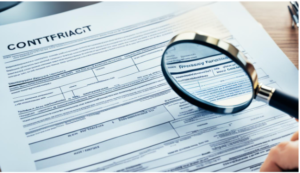In the dynamic and potentially lucrative world of real estate investing, conducting thorough due diligence is an essential step that can make or break the success of your investments. This comprehensive guide will walk you through the key elements of real estate due diligence, equipping you with the knowledge and strategies to mitigate risks and make informed decisions that protect your financial interests.

As real estate investors, we understand the allure of potential profits and the importance of carefully evaluating each investment opportunity. Due diligence, the process of thoroughly researching and analyzing a property before making a purchase, is crucial to ensuring that our investments are sound and secure. By delving into the legal, financial, and physical aspects of a property, we can identify potential risks, uncover hidden liabilities, and make informed decisions that safeguard our investment portfolios.
In this guide, we will explore the various components of real estate due diligence, providing you with a comprehensive understanding of the steps you should take to evaluate a property thoroughly. From understanding the legal and regulatory compliance to analyzing the financial viability and market conditions, we will equip you with the tools and strategies needed to navigate the complexities of the real estate investment landscape and secure your financial future.
Understanding the Importance of Due Diligence in Real Estate
Real estate due diligence is a crucial step in the investment process. By thoroughly investigating a property before making a purchase, investors can uncover potential issues, identify risks, and make well-informed decisions that protect their investment. Conducting comprehensive real estate due diligence is essential for mitigating investment risks and safeguarding your financial future.
Mitigating Risks and Protecting Your Investment
Real estate due diligence allows investors to proactively identify and address a wide range of potential risks, including legal, financial, physical, and operational concerns. By thoroughly evaluating the property, its history, and the surrounding market, investors can make informed decisions that minimize the likelihood of costly surprises or unexpected liabilities.
The Consequences of Skipping Due Diligence
Failing to perform adequate real estate due diligence can expose investors to a range of financial, legal, and operational pitfalls. Without a comprehensive understanding of the property and its associated risks, investors may make decisions that lead to costly mistakes, lost opportunities, or even legal disputes. Skipping due diligence can jeopardize the entire investment, making it crucial for investors to prioritize this essential step in the real estate acquisition process.

“Conducting thorough real estate due diligence is the best way to protect your investment and ensure long-term success in the market.”
By understanding the importance of real estate due diligence, investors can make informed decisions, mitigate investment risks, and safeguard their financial future. Taking the time to thoroughly evaluate a property and its associated risks is a crucial step in the investment process, one that can ultimately make the difference between a successful and a problematic real estate investment.
Comprehensive Real Estate Due Diligence Checklist
As real estate investors, we understand the importance of conducting thorough due diligence before securing a deal. A comprehensive checklist is the foundation for mitigating risks and protecting our investments. This checklist should include a meticulous review of legal and regulatory compliance, as well as a detailed financial and market analysis.
Legal and Regulatory Compliance
Ensuring legal and regulatory compliance is crucial when investing in real estate. Our due diligence checklist should cover the following:
- Verifying property title and ownership history
- Reviewing zoning regulations and land-use restrictions
- Checking for any outstanding liens, encumbrances, or legal disputes
- Confirming compliance with building codes and local ordinances
Financial and Market Analysis
Conducting a thorough financial and market analysis is essential for securing real estate deals. Our checklist should include:
- Evaluating current and historical rental income, occupancy rates, and expense data
- Projecting future cash flow and profitability based on market trends
- Analyzing comparable properties and their pricing in the local market
- Assessing the overall economic conditions and job market in the area
By systematically reviewing these critical elements, we can gain a comprehensive understanding of the property’s viability and potential risks, ultimately positioning ourselves to secure real estate deals with confidence.
| Due Diligence Checklist Item | Description |
| Property Title and Ownership | Verify the property’s title history, ownership, and any outstanding liens or encumbrances. |
| Zoning and Land Use | Review zoning regulations, land-use restrictions, and compliance with local ordinances. |
| Rental Income and Expenses | Evaluate current and historical rental income, occupancy rates, and operating expenses. |
| Market Analysis | Analyze comparable properties, pricing trends, and overall economic conditions in the local market. |

Due diligence, real estate investments
Conducting thorough due diligence is a crucial step for real estate investors seeking to minimize risks and make informed decisions. By carefully researching and evaluating a property, investors can uncover potential issues, identify growth opportunities, and ensure that their investments align with their financial goals and risk tolerance.
Due diligence in real estate investments involves a comprehensive analysis of various aspects of the property, including its legal, financial, and physical condition. This process helps investors gain a deeper understanding of the property and its potential challenges, ultimately enabling them to make more informed and strategic investment decisions.
To ensure a successful real estate investment, we recommend focusing on the following key areas of due diligence:
- Legal and Regulatory Compliance – Verifying the property’s legal status, zoning regulations, and any existing encumbrances or liens.
- Financial and Market Analysis – Examining the property’s financial performance, rental income, expenses, and the overall market conditions.
- Property Inspection and Condition Assessment – Conducting a thorough inspection of the property to identify any structural, mechanical, or maintenance issues.
- Location and Neighborhood Evaluation – Assessing the property’s location, accessibility, and the surrounding neighborhood’s characteristics and amenities.
- Environmental and Zoning Risks – Identifying any potential environmental hazards or zoning restrictions that could impact the property’s use and value.
By meticulously addressing these aspects of due diligence, real estate investors can make well-informed decisions and minimize the risks associated with their investments. Remember, a comprehensive due diligence process is the foundation for a successful and profitable real estate investment.

impression should be one of thoroughness and careful consideration.
| Key Areas of Due Diligence | Benefits |
| Legal and Regulatory Compliance | Ensures the property’s legal status and compliance with regulations |
| Financial and Market Analysis | Provides insights into the property’s financial performance and market conditions |
| Property Inspection and Condition Assessment | Identifies any structural, mechanical, or maintenance issues |
| Location and Neighborhood Evaluation | Assesses the property’s accessibility and the surrounding area’s characteristics |
| Environmental and Zoning Risks | Identifies potential hazards or restrictions that could impact the property’s use and value |
Property Inspection and Condition Assessment
When it comes to securing real estate deals, a thorough property inspection and condition assessment is a crucial step in the due diligence process. This comprehensive evaluation helps investors identify any potential issues or necessary repairs, enabling them to make informed decisions and estimate the associated costs accurately.
Hiring Professional Inspectors
Engaging experienced professional inspectors is essential for a comprehensive property assessment. These experts possess the necessary skills and knowledge to evaluate the structural integrity, systems, and overall condition of the property. By identifying potential problems, investors can better understand the investment’s true condition and make informed decisions to protect their real estate deals.
The real estate due diligence checklist should include the following key points when hiring professional inspectors:
- Verify the inspector’s credentials and experience in the local real estate market.
- Ensure the inspector is licensed, bonded, and insured to protect your investment.
- Discuss the scope of the inspection and any specialized assessments required, such as HVAC, plumbing, or electrical systems.
- Obtain a detailed inspection report that outlines the property’s condition, any necessary repairs, and estimated costs.
By conducting a thorough property inspection and condition assessment with the help of professional inspectors, investors can make more informed decisions and secure real estate deals with greater confidence.
| Inspection Type | Key Considerations |
| Structural Inspection | Evaluate the foundation, roof, walls, floors, and overall structural integrity of the property. |
| Systems Inspection | Assess the condition of the HVAC, plumbing, electrical, and other essential systems. |
| Environmental Inspection | Identify any potential environmental hazards, such as lead-based paint or asbestos. |
“A thorough property inspection is the best way to uncover hidden issues and ensure the investment aligns with your long-term goals.”
By prioritizing property inspection and condition assessment, investors can make more informed decisions, mitigate risks, and secure real estate deals with confidence.
Evaluating the Location and Neighborhood
When it comes to real estate investments, the old adage “location, location, location” holds true. A property’s location and surrounding neighborhood can significantly impact its value, appeal, and long-term viability. As part of the real estate due diligence process, investors must carefully analyze various factors related to the property’s location to determine its suitability and investment risk management.
One of the key aspects to consider is the property’s accessibility. Is it easily accessible by major roads, public transportation, or other modes of transportation? This can directly affect the property’s appeal to potential tenants or buyers, as well as its overall value.
Another important factor is the availability of amenities in the neighborhood. Proximity to shopping, restaurants, healthcare facilities, schools, and recreational areas can make a property more desirable and increase its long-term potential. Evaluating the quality and reputation of local schools is particularly crucial for investors targeting families as potential tenants or buyers.
Crime rates and the overall safety of the neighborhood should also be thoroughly analyzed. High crime rates can deter potential tenants or buyers, negatively impacting the property’s value and long-term stability.
- Evaluate the property’s accessibility and transportation options
- Assess the availability and quality of local amenities
- Analyze the neighborhood’s crime rates and overall safety
- Consider the potential for future development or gentrification
By conducting a comprehensive analysis of the location and neighborhood, investors can make informed decisions that minimize investment risk management and maximize the long-term potential of their real estate investments.

Analyzing Rental Income and Expenses
When investing in real estate, it’s crucial to conduct a thorough analysis of the property’s rental income and associated expenses. This due diligence process helps us understand the true financial potential and profitability of the investment.
Projecting Cash Flow and Profitability
To assess the investment’s viability, we must carefully evaluate the property’s current and historical rental rates, occupancy levels, and operating costs. By projecting the cash flow and profitability, we can make informed decisions about the financial feasibility of the real estate investment.
Here are some key factors to consider when analyzing rental income and expenses:
- Rental Rates: Investigate the current market rates for similar properties in the area, as well as any potential for future rent increases.
- Occupancy Rates: Examine the property’s historical occupancy levels to estimate the expected rental income.
- Operating Expenses: Carefully review all costs associated with maintaining the property, such as property taxes, insurance, utilities, repairs, and management fees.
By carefully projecting the cash flow and profitability of the investment, we can make informed decisions that mitigate investment risk and maximize the potential for long-term success.
“Successful real estate investing involves meticulous due diligence to fully understand the financial viability of a property.”
Conducting a comprehensive analysis of rental income and expenses is a critical step in the due diligence process for real estate investments. This ensures we make informed decisions that protect our investment and maximize the potential for long-term profitability.
Reviewing Property Documents and Disclosures
When it comes to conducting a thorough real estate due diligence checklist, reviewing all property-related documents and disclosures is a crucial step. This comprehensive review can uncover potential issues, identify any encumbrances or liens, and ensure the property’s legal and financial standing, ultimately helping investors secure real estate deals with confidence.
As we delve into the due diligence process, we’ll explore the key documents and disclosures that demand our attention:
- Title deeds and ownership records
- Lease agreements and tenant information
- Zoning regulations and land-use restrictions
- Property tax records and assessments
- Environmental reports and disclosures
- Mortgage and lien information
By carefully scrutinizing these documents, we can gain a deeper understanding of the property’s history, its current legal and financial status, and any potential risks or liabilities that may impact the investment. This meticulous approach is essential in protecting our interests and making informed decisions throughout the real estate due diligence checklist process.
| Document | Purpose | Key Considerations |
| Title Deeds | Establish legal ownership and any encumbrances | Check for liens, easements, or other ownership claims |
| Lease Agreements | Understand tenant information and rental income | Review terms, conditions, and tenant creditworthiness |
| Zoning Regulations | Ensure compliance with local land-use laws | Verify permitted uses and any development restrictions |
| Environmental Reports | Identify potential environmental hazards or liabilities | Assess any contamination or compliance issues |
By thoroughly reviewing these critical documents and disclosures, we can uncover valuable insights and make informed decisions that ultimately contribute to the secure real estate deals we seek to achieve.
Assessing Environmental and Zoning Risks
Conducting thorough real estate due diligence involves evaluating potential environmental and zoning-related risks. As real estate investors, we must carefully investigate any possible environmental hazards, such as contamination or underground storage tanks, that could jeopardize the property’s value and our investment.
Furthermore, reviewing zoning regulations and land use restrictions is crucial. Identifying these potential liabilities can help us make informed decisions about the property’s suitability for our investment goals and avoid costly issues down the line.
Identifying Potential Liabilities
To assess environmental and zoning risks, we should consider the following steps:
- Obtain a comprehensive environmental site assessment to identify any existing or potential contamination, including soil, groundwater, or air quality issues.
- Review historical records and property documents to uncover any previous environmental incidents or remediation efforts.
- Evaluate the property’s zoning designation and permitted land uses to ensure they align with our intended use.
- Investigate any zoning restrictions, such as setbacks, height limitations, or use limitations, that could impact our development or renovation plans.
| Risk Factor | Potential Impact | Mitigation Strategies |
| Environmental Contamination | Costly cleanup, liability, and delays in development | Comprehensive environmental assessments, soil and groundwater testing, and remediation planning |
| Zoning Restrictions | Limitations on property use, development, or renovation | Thorough zoning review, communication with local authorities, and consideration of zoning variances or rezoning |
By proactively identifying and addressing these environmental and zoning risks, we can mitigate potential liabilities and make more informed real estate investment decisions that align with our long-term goals and risk management strategies.
“Proper due diligence is the foundation of successful real estate investing. Ignoring environmental and zoning risks can lead to costly surprises and derail even the most promising deals.”
Working with Experienced Real Estate Professionals
When it comes to secure real estate deals and managing investment risk, collaborating with experienced real estate professionals can make all the difference. These experts, including attorneys, accountants, and brokers, possess invaluable insights and specialized knowledge that can guide us through the complexities of real estate transactions.
By leveraging their expertise, we can navigate the due diligence process more effectively, identify potential risks, and make informed decisions that protect our investments. Real estate professionals can provide valuable advice on legal compliance, financial analysis, and market trends, ensuring that we are fully prepared to make sound investment choices.
Investing in real estate is a significant undertaking, and working with a team of experienced professionals can be the key to securing real estate deals that minimize our investment risk. Their guidance and support can help us avoid costly mistakes and maximize the potential of our real estate investments.
FAQ
What is the importance of conducting due diligence in real estate investments?
Conducting thorough due diligence is essential for real estate investors to mitigate risks and protect their financial interests. By carefully investigating and evaluating a property, we can uncover potential issues, identify growth opportunities, and ensure that our investments align with our financial goals and risk tolerance.
What are the key elements of a comprehensive real estate due diligence checklist?
A comprehensive real estate due diligence checklist should include a thorough review of legal and regulatory compliance, as well as a detailed financial and market analysis. This includes examining property titles, zoning regulations, rental income, and market trends to gain a comprehensive understanding of the property’s viability and potential risks.
Why is it important to hire professional inspectors for a property condition assessment?
Hiring experienced professional inspectors is a crucial step in the due diligence process. These experts can assess the property’s structural integrity, systems, and overall condition, allowing us to identify any potential issues or necessary repairs. This information helps us better estimate the costs associated with the investment and make more informed decisions.
How does the location and neighborhood of a property impact its investment potential?
The location and surrounding neighborhood of a property can significantly influence its value, appeal, and long-term viability. As part of the due diligence process, we should carefully analyze factors such as accessibility, amenities, crime rates, school districts, and potential for future development or gentrification. This comprehensive evaluation can help us determine the property’s suitability and long-term investment potential.
What financial factors should we consider when analyzing rental income and expenses?
For investors seeking rental income, analyzing the property’s rental potential and associated expenses is crucial. This includes reviewing current and historical rental rates, occupancy rates, operating costs, and potential for future rent increases. By projecting the property’s cash flow and profitability, we can make informed decisions about the investment’s financial viability.
Why is it important to review property documents and disclosures?
Thorough review of all property-related documents and disclosures is an essential part of the due diligence process. This includes examining the title, deeds, lease agreements, zoning regulations, and any other relevant legal and financial records. By carefully scrutinizing these documents, we can uncover potential issues, identify any encumbrances or liens, and ensure the property’s legal and financial standing.
How can evaluating environmental and zoning risks impact a real estate investment decision?
Evaluating environmental and zoning risks is crucial for real estate investors. This includes investigating any potential environmental hazards, such as contamination or underground storage tanks, as well as reviewing zoning regulations and land use restrictions. Identifying these potential liabilities can help us avoid costly issues down the line and make more informed decisions about the property’s suitability for our investment goals.
Why is it beneficial to work with experienced real estate professionals during the due diligence process?
Collaborating with experienced real estate professionals, such as attorneys, accountants, and brokers, can greatly enhance the due diligence process. These experts can provide valuable insights, guidance, and specialized knowledge to help us navigate the complexities of real estate transactions, identify potential risks, and make more informed decisions that protect our investments



